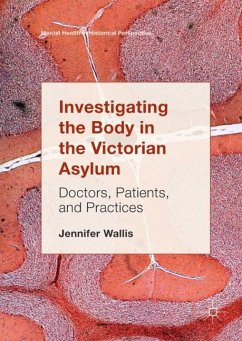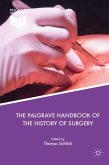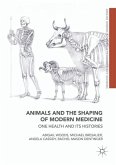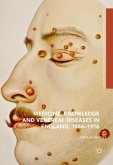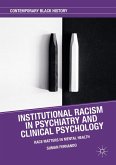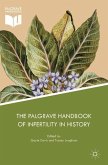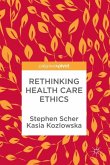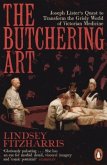This book is open access under a CC BY 4.0 license.
This book explores how the body was investigated in the late nineteenth-century asylum in Britain. As more and more Victorian asylum doctors looked to the bodily fabric to reveal the 'truth' of mental disease, a whole host of techniques and technologies were brought to bear upon the patient's body. These practices encompassed the clinical and the pathological, from testing the patient's reflexes to dissecting the brain.
Investigating the Body in the Victorian Asylum takes a unique approach to the topic, conducting a chapter-by-chapter dissection of the body. It considers how asylum doctors viewed and investigated the skin, muscles, bones, brain, and bodily fluids. The book demonstrates the importance of the body in nineteenth-century psychiatry as well as how the asylum functioned as a site of research, and will be of value to historians of psychiatry, the body, and scientific practice.
This book explores how the body was investigated in the late nineteenth-century asylum in Britain. As more and more Victorian asylum doctors looked to the bodily fabric to reveal the 'truth' of mental disease, a whole host of techniques and technologies were brought to bear upon the patient's body. These practices encompassed the clinical and the pathological, from testing the patient's reflexes to dissecting the brain.
Investigating the Body in the Victorian Asylum takes a unique approach to the topic, conducting a chapter-by-chapter dissection of the body. It considers how asylum doctors viewed and investigated the skin, muscles, bones, brain, and bodily fluids. The book demonstrates the importance of the body in nineteenth-century psychiatry as well as how the asylum functioned as a site of research, and will be of value to historians of psychiatry, the body, and scientific practice.
"Investigating the Body in the Victorian Asylum is ultimately more interested in uncovering the scientific questions asylum doctors asked than in assessing the conclusiveness of their answers. ... Analyzing these practices with both subtlety and depth, Wallis provides an important historical postmortem of the Victorian asylum 'as a scientific space' committed to investigating the body in pursuit of the mind ... ." (Athena Vrettos, Victorian Studies, Vol. 62 (4), 2020)
"Investigating the Body in the Victorian Asylum offers a genuine, innovative, and interdisciplinary analysis of the patient's body within the asylum setting. The rigorous research and the accessible nature of this book together make it a perfect read for anyone, from the undergraduate to the experienced scholar, who is interested in the history of psychiatry in the late nineteenth century and the practice of medical and scientific research at the time." (Cristiano Turbil, Isis, Vol. 111 (1), 2020)
"Jennifer Wallis's Investigating Body in the Victorian Asylum: Doctors, Patients, and Practices, part of the Mental Health in Historical Perspective series sets to demonstrate how asylum doctors sought to locate mental illness on the body. ... Overall, Wallis's work provides a fresh, important, and much-needed contribution to the history of psychiatry, the body, and medicine more broadly." (Lynsey Cullen, H-Net Reviews Humanities and Social Sciences, networks.h-net.org, August, 2018)
"Investigating the Body in the Victorian Asylum provides a meticulously researched and thoroughly readable - for all - social history of an important development in the mental sciences in the nineteenth century, centring it around the evolving practices of post-mortem examinations. I particularly like the way in which Wallis writes herself, her research process and her thinking into the book." (Louise Hide, HHS History of The Human Sciences, histhum.com, August, 2018)
"This book is a valuable contribution to a number of overlapping fields; historians of psychiatry and of science, historical geographers and medical humanists will find inspiration in the way this work delves into a dimension of asylumdom underexplored within the literature. ... an indispensable resource for historians of science. ... this work will engage interested scholars at various stages of academia, from undergraduate students and postgraduate researchers to experienced course convenors." (Sarah Phelan, Journal of Historical Geography, Iss. 1-2, 2018)
"Investigating the Body in the Victorian Asylum offers a genuine, innovative, and interdisciplinary analysis of the patient's body within the asylum setting. The rigorous research and the accessible nature of this book together make it a perfect read for anyone, from the undergraduate to the experienced scholar, who is interested in the history of psychiatry in the late nineteenth century and the practice of medical and scientific research at the time." (Cristiano Turbil, Isis, Vol. 111 (1), 2020)
"Jennifer Wallis's Investigating Body in the Victorian Asylum: Doctors, Patients, and Practices, part of the Mental Health in Historical Perspective series sets to demonstrate how asylum doctors sought to locate mental illness on the body. ... Overall, Wallis's work provides a fresh, important, and much-needed contribution to the history of psychiatry, the body, and medicine more broadly." (Lynsey Cullen, H-Net Reviews Humanities and Social Sciences, networks.h-net.org, August, 2018)
"Investigating the Body in the Victorian Asylum provides a meticulously researched and thoroughly readable - for all - social history of an important development in the mental sciences in the nineteenth century, centring it around the evolving practices of post-mortem examinations. I particularly like the way in which Wallis writes herself, her research process and her thinking into the book." (Louise Hide, HHS History of The Human Sciences, histhum.com, August, 2018)
"This book is a valuable contribution to a number of overlapping fields; historians of psychiatry and of science, historical geographers and medical humanists will find inspiration in the way this work delves into a dimension of asylumdom underexplored within the literature. ... an indispensable resource for historians of science. ... this work will engage interested scholars at various stages of academia, from undergraduate students and postgraduate researchers to experienced course convenors." (Sarah Phelan, Journal of Historical Geography, Iss. 1-2, 2018)

